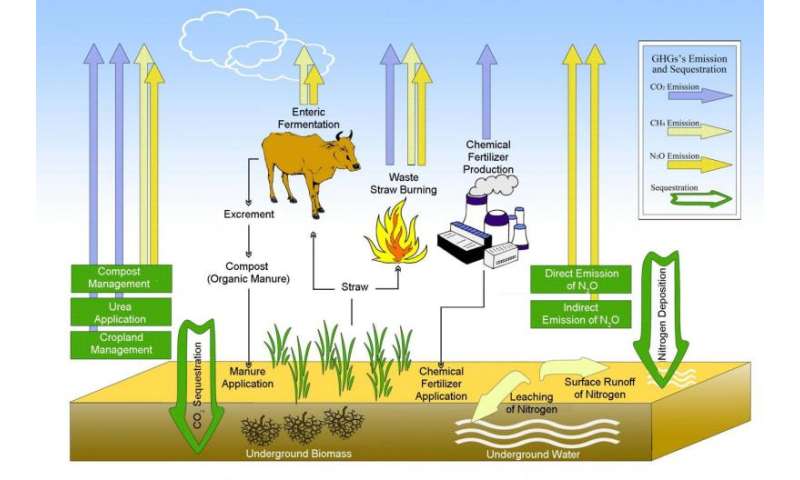Organic farming can reverse the agriculture ecosystem from a carbon source to a carbon sink

Approximately 35% of global greenhouse gases (GHGs) come from agriculture. Some argues that human can reverse global worming by sequestering several hundred billion tons of excess CO2 through regenerative, organic farming, ranching and land use. Increasing the soil's organic content will not only fix carbon and reduce emissions, it will also improve the soil's ability to retain water and nutrients and resist pests and droughts.
To mitigate GHG emissions and retain soil fertility, organic agriculture might be a wise choice for decreasing the intensive use of synthetic fertilizers, protecting environments, and further improving crop yields. Recent research showed that replacing chemical fertilizer with organic manure significantly decreased the emission of GHGs. Organic farming can reverse the agriculture ecosystem from a carbon source to a carbon sink.
To explore the potential of farmlands acting as a carbon sink without yield losses, Jiang Gaoming, a professor at the Chinese Academy of Sciences' Institute of Botany, conducted an experiment on a temperate eco-farm in eastern rural China. Crop residues were applied to cattle feed and the composted cattle manure was returned to cropland with a winter wheat and maize rotation. Crop yield and greenhouse gas (GHG) emissions were carefully calculated according to the Intergovernmental Panel on Climate Change (IPCC) Guidelines for National Greenhouse Gas Inventories 2006.
This study showed that replacing chemical fertilizer with organic manure significantly decreased the emission of GHGs. Yields of wheat and corn also increased as the soil fertility was improved by the application of cattle manure. Totally replacing chemical fertilizer with organic manure decreased GHG emissions, which reversed the agriculture ecosystem from a carbon source (+ 2.7 t CO2-eq. hm-2 yr-1) to a carbon sink (- 8.8 t CO2-eq. hm-2 yr-1).
Making full use of crop residues as forage for cattle, collecting and composting cattle manure, and replacing part of the chemical fertilizer input with organic manure have been successfully shown to be ideal choices to reduce energy waste and cut GHG emissions without crop yield losses. A combination of organic manure and chemical fertilizer demonstrated the best result in improving soil quality and crop yields, while decreasing GHG emissions. Solely utilizing chemical fertilizer on the farmland not only led to increased GHG emissions, but also deteriorated the quality of the soil.
More information:
Haitao Liu, J.L., Xiao Li, Yanhai Zheng, Sufei Feng, Gaoming Jiang. 2015. Mitigating greenhouse gas emissions through replacement of chemical fertilizer with organic manure in a temperate farmland. Science Bulletin, 60(6), 598-606.
Provided by Science China Press